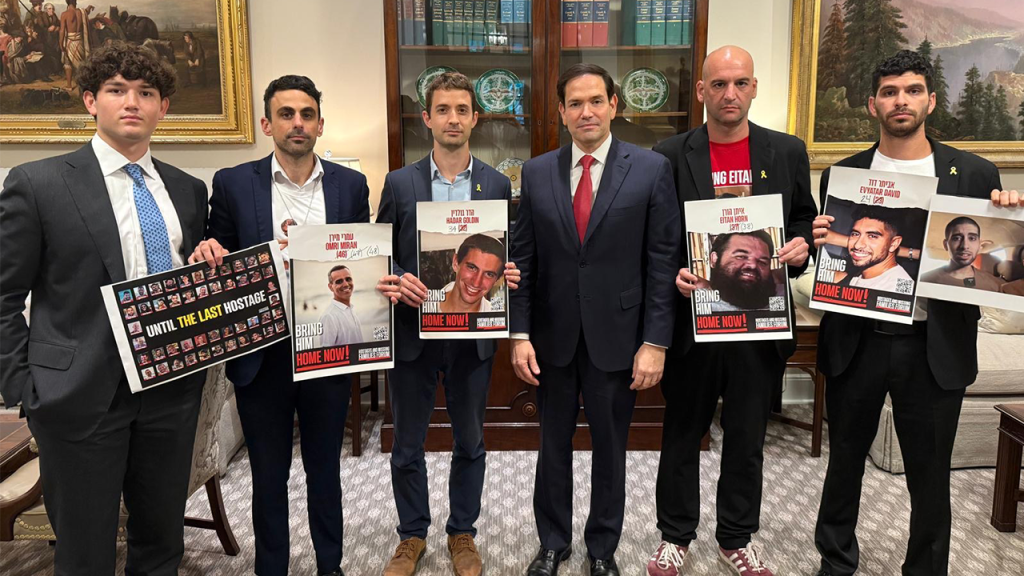In a poignant reflection marking 4,000 days since the death of Israeli soldier Hadar Goldin, his mother, Leah Goldin, emphasizes the urgent need for action regarding the return of her son’s remains. Killed during a U.S.-brokered ceasefire in 2014 by Hamas, Hadar’s body has since been withheld, a situation that Leah argues is more than a personal tragedy—it is a matter of international law and a moral obligation. In recent interviews, she has called on influential leaders, particularly those in the U.S., to prioritize the return of hostages and the remains of fallen soldiers within peace negotiations in the region.
| Article Subheadings |
|---|
| 1) Background on Hadar Goldin’s Capture |
| 2) The Family’s Continued Advocacy |
| 3) The Role of International Law |
| 4) The Impact of Recent Developments |
| 5) Call to Action for Leadership |
Background on Hadar Goldin’s Capture
Hadar Goldin was an Israeli soldier known for his artistic talent and gentle spirit. Raised in a family dedicated to education, he embodied the values of faith and service. Born on October 8, 1990, Hadar joined the elite Givati Brigade to serve his nation, where he was known not only for his military prowess but also for his compassion. During the 2014 Operation Protective Edge, a ceasefire was negotiated with the involvement of the U.S. and U.N. However, on August 1, Hamas violated this ceasefire by launching a sudden attack that resulted in Hadar’s death. In a tragedy that has not only affected his family but the military ethos of Israel, Hadar’s body was taken into Gaza and has been held captive ever since.
The Family’s Continued Advocacy
For the past decade, Leah Goldin has tirelessly campaigned for the return of her son’s remains. Engaging with world leaders, legislators, and military officials in the U.S. and European nations, she emphasizes that the absence of Hadar is a matter of urgency that should influence international diplomacy. “These deals are a bluff — and this selective process is horrific,” Leah said in a recent interview, illuminating the psychological toll on families like hers who are caught in the prolonged conflict. Her advocacy extends beyond personal loss; she aims to ensure that no family suffers as hers has, fostering a supportive community for families of current hostages through initiatives like the Hostage and Missing Families Forum.
The Role of International Law
Leah Goldin points to U.N. Security Council Resolution 2474, which was passed in 2019, emphasizing its implications for the ethical treatment of the dead during armed conflict. This resolution obligates all parties engaged in warfare to return remains as a humanitarian act and a confidence-building measure. “This is international law,” Leah stated, yet she finds it troubling that Hadar remains unaccounted for, despite these conventions. Her outlook on the situation illustrates a disconnect between established legal frameworks and ongoing conflict, as her advocacy highlights the lack of compliance with moral obligations on the international stage.
The Impact of Recent Developments
In light of recent diplomatic movements involving Iran, Saudi Arabia, and Gaza, Leah Goldin perceives a unique opportunity to place pressure on the relevant governments to demand the return of Hadar and others held captive. “Saudi Arabia has enormous leverage,” she explained, suggesting that if they truly seek normalization with Israel, they should reciprocate this step by advocating for the return of hostages as a gesture of goodwill. Through her engagements, Leah stresses that negotiations should not proceed without also addressing the humanitarian crisis represented by the missing soldiers, arguing that such considerations are imperative for any meaningful progress towards peace.
Call to Action for Leadership
Leah’s appeal extends to high-ranking officials and policymakers in the U.S. She lauded the efforts of people within the Trump administration, such as Jason Greenblatt and Nikki Haley, in recognizing the importance of dealing with the humanitarian crisis surrounding the hostages. Reflecting on how discussions surrounding peace in the Middle East often overlook the plight of families with missing loved ones, Leah insists that leaders cannot prioritize political agreements over human lives. “Don’t say you’ll finish the business and deal with the hostages later. That’s immoral,” she expressed, emphasizing that meaningful negotiations must include the unconditional return of captives as a core principle.
| No. | Key Points |
|---|---|
| 1 | Hadar Goldin has been missing for 4,000 days since his death during a military conflict. |
| 2 | Leah Goldin advocates for international law to be upheld regarding the return of remains. |
| 3 | Recent diplomatic developments present a chance for leverage over hostage negotiations. |
| 4 | The need for leaders to address humanitarian crises in Middle East negotiations. |
| 5 | Families of hostages demand a comprehensive approach from officials to resolve their plight. |
Summary
The ongoing struggle surrounding Hadar Goldin’s remains symbolizes a broader humanitarian crisis in the context of the Israeli-Palestinian conflict. Leah Goldin’s relentless advocacy underscores the need for compassion and moral urgency in diplomatic discussions. As leaders from around the world navigate complex negotiations, it is essential to prioritize the return of hostages and remains of fallen soldiers, recognizing that every lost life has a family and a story deserving of respect and remembrance.
Frequently Asked Questions
Question: Who was Hadar Goldin?
Hadar Goldin was a 23-year-old Israeli soldier who was killed by Hamas during a U.S.-brokered ceasefire in 2014.
Question: What is U.N. Security Council Resolution 2474?
Resolution 2474 obligates parties in armed conflict to return the remains of the deceased as a humanitarian act and a confidence-building measure.
Question: How has Leah Goldin engaged with international leaders?
Leah Goldin has actively met with various world leaders, military officials, and lawmakers to advocate for the return of her son’s remains and the recognition of families affected by hostage situations.


